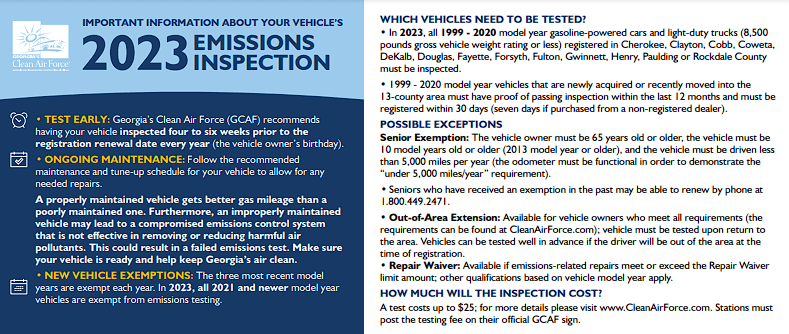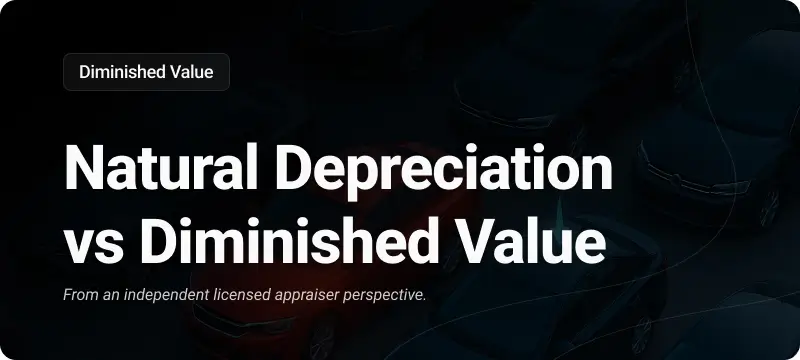2023 Georgia Emissions Requirements (PDF)
Important information about your vehicles’ 2023 emissions inspection:
- Get your test done early: In Georgia, the Clean Air Force recommends having your vehicle inspected four to six weeks before the registration renewal date, the birthday of the vehicle owner.
- Ongoing maintenance: Maintain your vehicle according to the recommended maintenance schedule to prevent future problems. A well-maintained vehicle will get better gas mileage than a poorly maintained one. Additionally, improperly maintained vehicles may result in a compromised emissions control system that is not effective in reducing or removing harmful air pollutants. It could result in a failed emissions test. Help keep Georgia’s air clean by making sure your vehicle is ready.
- Exemptions for new vehicles: Every year, the three most recent model years are exempt. In 2023, all 2021 and newer model years will be exempt.
What vehicles need to be tested?
- In 2023, all 1999 – 2020 model year gasoline-powered cars and light-duty trucks (8,500 pounds gross vehicle weight rating or less) registered in Cherokee, Clayton, Cobb, Coweta, DeKalb, Douglas, Fayette, Forsyth, Fulton, Gwinnett, Henry, Paulding or Rockdale County must be inspected.
- 1999 – 2020 model-year vehicles that are newly acquired or recently moved into the 13-county area must have proof of passing inspection within the last 12 months and must be registered within 30 days (seven days if purchased from a non-registered dealer).
Possible exemptions
- Senior Exemption: The vehicle owner must be 65 years old or older, the vehicle must be 10 model years old or older (2013 model year or older), and the vehicle must have been driven less than 5,000 miles per year (the odometer must be functional to prove the “under 5,000 miles/year” requirement). Seniors who have previously received an exemption may renew by phone at 1.800.449.2471.
- Out-of-Area Extension: Available for vehicle owners who meet all requirements (the requirements can be found at CleanAirForce.com); the vehicle must be tested upon return to the area. Vehicles can be tested well in advance if the driver will be out of the area at the time of registration.
- Repair Waiver: A Repair Waiver is available if emissions-related repairs meet or exceed the Repair Waiver limit amount; other qualifications are based on vehicle model year.
What is the cost of the inspection?
A test costs up to $25; for more details please visit www.CleanAirForce.com. Stations must post the testing fee on their official GCAF sign.
What if I purchased a used vehicle?
If the car will be registered in one of the 13 Georgia counties, it must have passed the emissions test at the time of sale if it is located within the 13-county testing area. You do not need to provide a paper copy of the vehicle inspection report (VIR). You can view a summary of your most recent VIR results at CleanAirForce.com.
Vehicle testing tips for model years 1999 – 2022
Before having an onboard diagnostic (OBD) inspection or retest, drive your vehicle for one to two weeks under normal conditions, including some highway driving.
A loose fuel cap or a major emissions control system problem may cause your vehicle’s “Check Engine” light to flash. If you present your vehicle for an inspection with the “Check Engine” light on, the inspector must test it, but it is unlikely to pass. Seek repairs before you have an emissions test.
For helpful repair tips, visit CleanAirForce.com.
If my vehicle fails, what should I do?
If your vehicle does not meet the required emissions standards, you will receive a VIR from your inspector. Along with this, they will give you a blank Emissions Repair Form as well as a GCAF Q&A brochure which outlines retest information. For those who are looking for a reputable facility to complete emissions-related repairs, RepairWatch is available. This publication lists repair shops with reliable track records and can be accessed at both inspection stations and CleanAirForce.com. Keep in mind that the original station offers one free retest within 30 days of the initial test – including the day it was conducted – at the same time of day as the first inspection. Additionally, it is essential to note that according to federal law, the catalytic converter and on-board computer on vehicles 1995 or newer must have an 8-year/80,000-mile warranty from its manufacturer.




